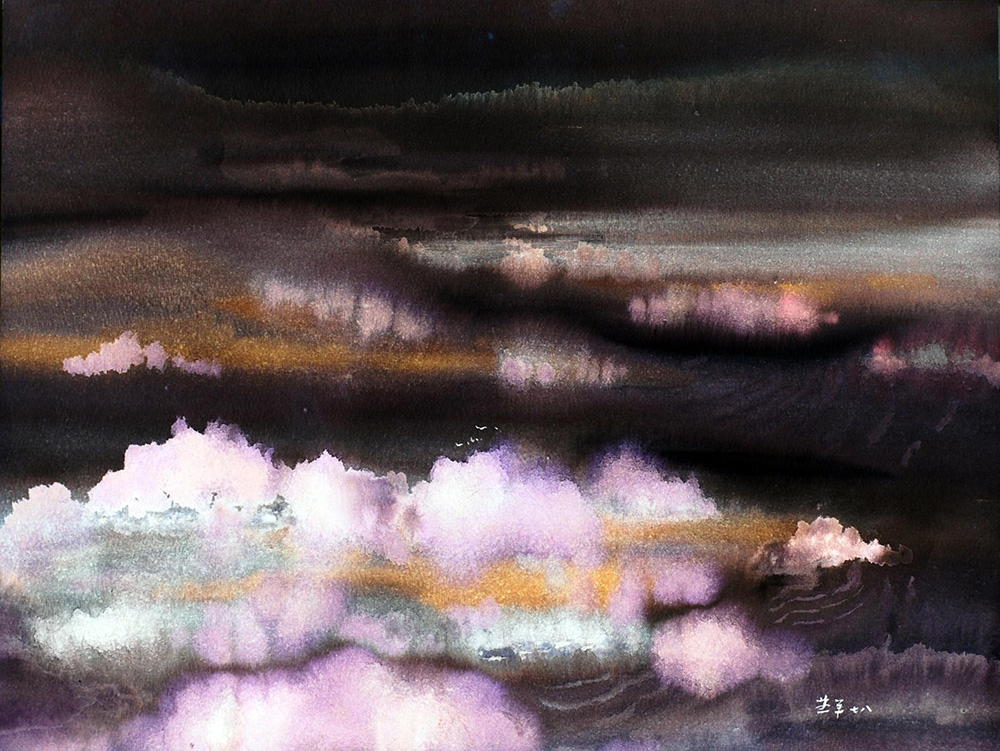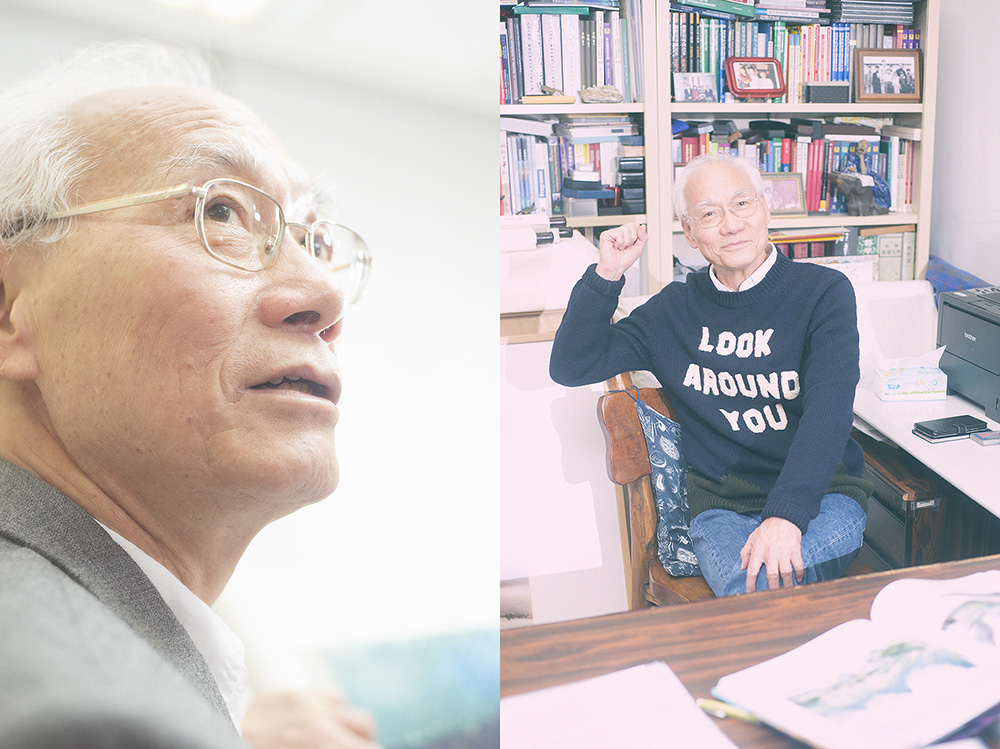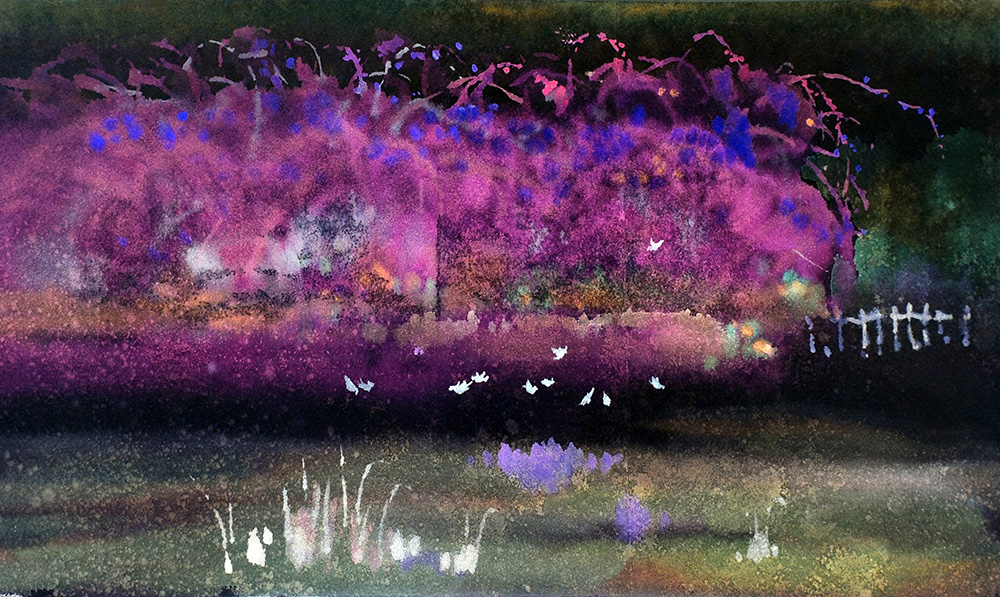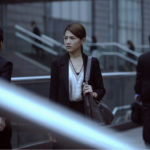

Left/左 : Professor Cheng Yin Cheong wears blazer by COS, white shirt his own. 鄭教授穿上COS 西裝,自已的白恤衫。 // Right/右 : He wears sweater and jeans by Sandro Homme, white shirt his own. 衛衣和牛仔褲 Sandro Homme,自已的白恤衫。
Artwork : 時空挪移【2】- 山居 【1978/2014】// Space-Time Transforming 【2】- Living in Mountain 2【1978/2014】
攝影及訪問 / Photos and Interview : Nick D for @precursorprints
中文撰文 / Chinese Translation : Lorien Chan
造型 / Stylee : 2 Dirty Guys for @precursorprints
攝影助手 / Photo Assist : Ric So
A day wandering aimlessly through Jordan, Kowloon saw me venture into the Commercial Press bookstore there and it’s Chinese art section. Thumbing through a few tomes, the artwork of professor Cheng Yin Cheong blew me away, and utterly changed the pace of my day. It’s contents, encompassing a lifetime of his watercolour paintings were stylish, vibrant, and thoroughly modern. Curious as to who’s work this was, it was a pleasant surprise to discover that Prof. Cheng Yin Cheong was from Hong Kong! His academic credentials were unparalleled. Having a doctorate from Harvard University even! I set out to get his story, as to why such a talent would be so low profile here in Hong Kong, and I am more than happy to share this interview with you.
你相信緣份嗎?有天我漫無目的地在佐敦亂逛,不知為什麼的就走進了一家書店,又不知怎樣的走到了中國藝術的書架前面。這種精神狀態,我根本就沒有心機看書架上任何一本書籍,不過是打發一下時間。突然之間一本畫冊吸引著我的目光,冊上色彩斑斓的水彩畫充滿活力、富現代感和又時尚,整個人頓時豁然開朗。我對這個畫家的工作十分好奇,仔細地看看到底是出自那位名家大師,才發現是來自香港的一個學者,鄭燕祥教授的作品。他的學歷背景十分厲害,哈佛畢業的鄭教授是個教育工作者、也是個推動中國文化藝術的先驅。為什麼這樣了不起的人材如此低調?於是我鼓起勇氣致電他相約了一次訪談的機會,這奇怪的經歷除了用緣份去形容,我也想不到別的形容了。
< <中文譯本在英文之後 >>
SPITGAN : Hello Prof. Cheng, thank you for letting us interview you. Can you introduce to us your background in art?
PROF. CHENG YIN CHEONG : I enjoy art and its creation very much. Unfortunately I do not have any formal training and qualification in art even though I hold a doctoral degree from Harvard University.
My interest in art started at the end of the 1960s when I was a physics student at The Chinese University of Hong Kong. After graduation in 1971, I began my career as a physics teacher as well as my long journey as an amateur painter. From 1985 to 2014, I was invited to hold six personal art exhibitions with the support of various cultural and art organizations. I was also invited by the Hong Kong Museum of Art to conduct special public lectures on the artwork of famous Hong Kong artists including Mr Gaylord Chan, Mr Hon Chi-fun, and Mr Ha Bik-chuen.
SG : You chose painting as your medium of expression over others, and watercolors in particular. Why?
CYC : In the beginning, I was very impressed by large sculptures. I planned to pursue sculpture but was unable to master the sophisticated techniques. In comparison, painting with watercolors was much easier, particularly for the beginners.
To me, medium is important, but more important is the creative ideas I express.
Finally, I chose and fell in love with watercolors, with which I could integrate the strengths of Western watercolor painting and Chinese ink painting to create my own painting style. The flow of watercolors on wet paper can create a lot of unexpected visual effects, it all depends on your imagination.
Watercolor painting becomes an exploration in which you may not know the outcome until completion of the painting. I believe I was very lucky to have chosen watercolors as my major art tool.

Artwork : 時空挪移【13】- 圍牆外【1975/2016】// Space-Time Transforming【13】- Beyond the Wall【1975/2016】
SG : What draws you to landscapes? It is clearly your favorite subject to paint.
CYC : A very good question. To some extent, its answer relates to my cultural root or philosophical view. In Asian or Chinese traditions, great artists often respect nature, the universe, and “Dao” (道) very much. In particular, they try to integrate their personal feelings, perceptions and emotions implicitly with the natural landscapes they paint. Accordingly, the expression of landscapes may represent the artists’ styles and views about themselves.
To me, I would like to say that the mountains, trees, and landscapes I painted are my mountains, my trees and my landscapes because they represent the personal ways or views of my life.
Another technical answer to your question. There are unlimited possibilities and approaches that can be adopted to express different aspects of landscapes. It means that it will be much easier and freer for me to paint landscapes than other subjects because their possible images (in terms of shape, content and color) are unlimited.
CONTINUE READING THE INTERVIEW AND SEE MORE OF PROF. CHENG YIN CHEONG’S WORK :



